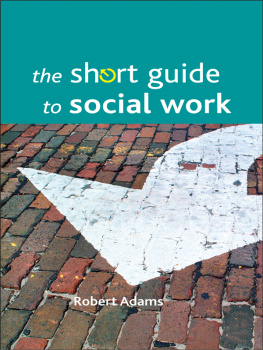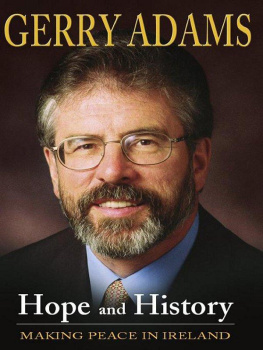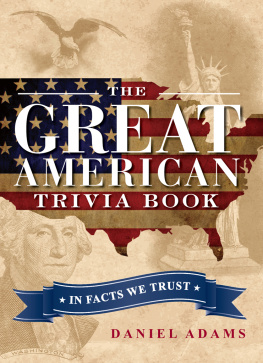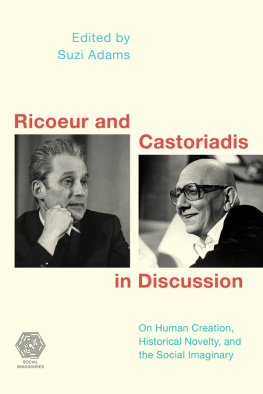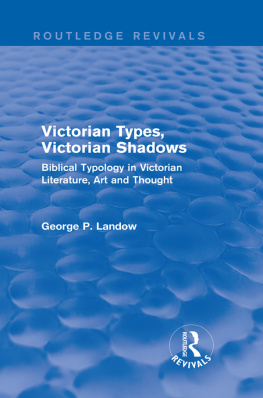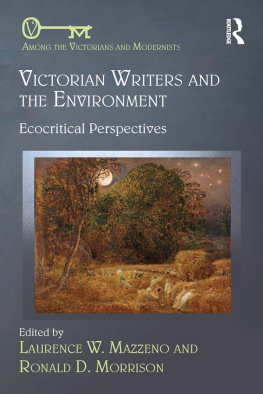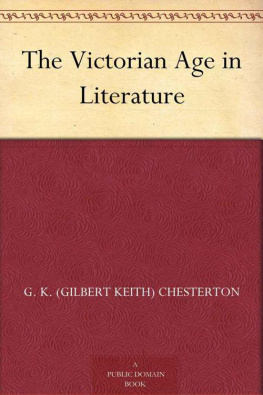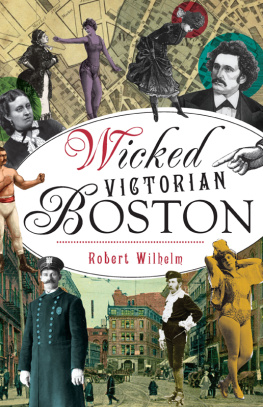Adams - A History of Victorian Literature
Here you can read online Adams - A History of Victorian Literature full text of the book (entire story) in english for free. Download pdf and epub, get meaning, cover and reviews about this ebook. year: 2011, publisher: John Wiley & Sons, Incorporated, genre: Religion. Description of the work, (preface) as well as reviews are available. Best literature library LitArk.com created for fans of good reading and offers a wide selection of genres:
Romance novel
Science fiction
Adventure
Detective
Science
History
Home and family
Prose
Art
Politics
Computer
Non-fiction
Religion
Business
Children
Humor
Choose a favorite category and find really read worthwhile books. Enjoy immersion in the world of imagination, feel the emotions of the characters or learn something new for yourself, make an fascinating discovery.

A History of Victorian Literature: summary, description and annotation
We offer to read an annotation, description, summary or preface (depends on what the author of the book "A History of Victorian Literature" wrote himself). If you haven't found the necessary information about the book — write in the comments, we will try to find it.
Adams: author's other books
Who wrote A History of Victorian Literature? Find out the surname, the name of the author of the book and a list of all author's works by series.
A History of Victorian Literature — read online for free the complete book (whole text) full work
Below is the text of the book, divided by pages. System saving the place of the last page read, allows you to conveniently read the book "A History of Victorian Literature" online for free, without having to search again every time where you left off. Put a bookmark, and you can go to the page where you finished reading at any time.
Font size:
Interval:
Bookmark:
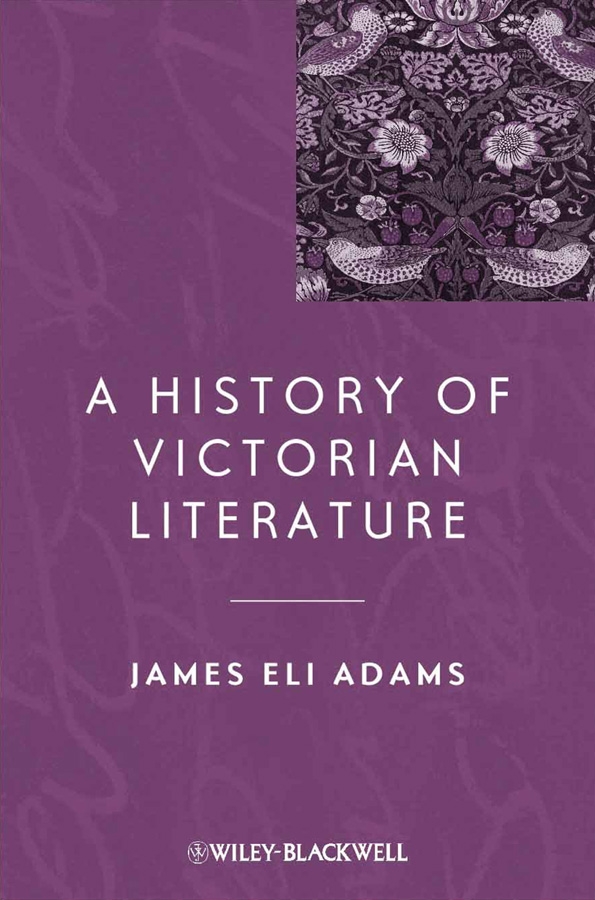
BLACKWELL HISTORIES OF LITERATURE
General editor: Peter Brown, University of Kent, Canterbury
The books in this series renew and redefine a familiar form by recognizing that to write literary history involves more than placing texts in chronological sequence. Thus the emphasis within each volume falls both on plotting the significant literary developments of a given period, and on the wider cultural contexts within which they occurred. Cultural history is construed in broad terms and authors address such issues as politics, society, the arts, ideologies, varieties of literary production and consumption, and dominant genres and modes. The effect of each volume is to give the reader a sense of possessing a crucial sector of literary terrain, of understanding the forces that give a period its distinctive cast, and of seeing how writing of a given period impacts on, and is shaped by, its cultural circumstances.
Published to date
Old English Literature | Robert Fulk |
Seventeenth-Century English Literature | Thomas N. Corns |
Victorian Literature | James Eli Adams |
Forthcoming
Eighteenth-Century British Literature | John Richetti |
Romanticism | Gary Kelly |
Irish Literature in English | Terence Brown |
British and Irish Literature 19452005 | Patricia Waugh |
Postcolonial Commonwealth Literature 19472000 | Shirley Chew |

This paperback edition first published 2012
2012 James Eli Adams
Edition history: Blackwell Publishing Ltd (hardback, 2009)
Blackwell Publishing was acquired by John Wiley & Sons in February 2007. Blackwells publishing program has been merged with Wileys global Scientific, Technical, and Medical business to form Wiley-Blackwell.
Registered Office
John Wiley & Sons Ltd, The Atrium, Southern Gate, Chichester, West Sussex, PO19 8SQ, UK
Editorial Offices
350 Main Street, Malden, MA 02148-5020, USA
9600 Garsington Road, Oxford, OX4 2DQ, UK
The Atrium, Southern Gate, Chichester, West Sussex, PO19 8SQ, UK
For details of our global editorial offices, for customer services, and for information about how to apply for permission to reuse the copyright material in this book please see our website at www.wiley.com/wiley-blackwell.
The right of James Eli Adams to be identified as the author of this work has been asserted in accordance with the UK Copyright, Designs and Patents Act 1988.
All rights reserved. No part of this publication may be reproduced, stored in a retrieval system, or transmitted, in any form or by any means, electronic, mechanical, photocopying, recording or otherwise, except as permitted by the UK Copyright, Designs and Patents Act 1988, without the prior permission of the publisher.
Wiley also publishes its books in a variety of electronic formats. Some content that appears in print may not be available in electronic books.
Designations used by companies to distinguish their products are often claimed as trademarks. All brand names and product names used in this book are trade names, service marks, trademarks or registered trademarks of their respective owners. The publisher is not associated with any product or vendor mentioned in this book. This publication is designed to provide accurate and authoritative information in regard to the subject matter covered. It is sold on the understanding that the publisher is not engaged in rendering professional services. If professional advice or other expert assistance is required, the services of a competent professional should be sought.
Library of Congress Cataloging-in-Publication Data
Adams, James Eli.
A history of Victorian literature / James Eli Adams.
p. cm. (Blackwell histories of literature)
Includes bibliographical references and index.
ISBN 978-0-631-22082-4 (cloth) ISBN 978-0-470-67239-6 (pbk.)
1. English literature19th centuryHistory and criticism. 2. Literature and societyGreat
BritainHistory19th century. I. Title.
PR461.A33 2009
820.9008dc22
2008031713
A catalogue record for this book is available from the British Library.
This book is published in the following electronic formats: ePDF [9781444305951]; ePub [9781444354898]; Wiley Online Library [9781444305944]; Mobi [9781444321005]
Preface
This is a narrative history addressed to students and general readers wishing to learn more about the world of Victorian literature. It naturally presumes an interest whetted by encounters with that body of writing, but it does not presume close prior acquaintance with particular authors or genres. The narrative is informed by a good deal of contemporary scholarship and criticism, but I offer little explicit engagement with academic criticism (although I have done my best to acknowledge general as well as specific forms of scholarly indebtedness). Instead, I have devoted the confining space to gathering in a broader range of texts and careers than otherwise would have been possible. Ive tried to balance the claims of category and chronology, hoping to steer between chronicle (The following works were published in 1843) and the guide, organized around genre or critical theme. The volume has a strong chronological thrust, and hence the introduction will be a more rewarding point of entry than the index. At the same time, the history necessarily depends on analyses of particular episodes or developments whose significance can be elicited only through departures (sometimes extensive) from strict chronology. My aim is to sketch a complex, changing field of literary production and reception without surrendering the rich particularity of individual works and authors.
One emphasis to this end is a great deal of attention to Victorian reviews of major writers. The most obvious value of contemporary reception is its capacity to crystallize what seems distinctive, sometimes strange, in Victorian structures of feeling (in Raymond Williamss useful phrase). Reviewing also offers a means of decomposing, as it were, our existing conceptions of major authors and genres, and thereby revivifying them. We can see literary careers less as unbroken, fixed expanses and more as ongoing, changing constructions, within which Victorian readers confronted phenomena very different from what we encounter in our Penguins. From this vantage were reminded, for example, that Dickenss career in the 1830s is not that of a novelist, but of an increasingly prolific and popular writer of magazine sketches, whose writing changes the very form of the novel. Reviews also remind us of how complexly literary form and value are bound up with a broad range of social norms most obviously, the force of gender and class. Particularly in the early stages of a writers career, a review can seem an exercise much like the sizing up of strangers that is such an important experience in Victorian novels. As they try to place new or emergent authors, reviewers are especially likely to reveal their tacit norms and expectations, and thus to give us a sense of the audiences that the author is trying to reach. In the process, they offer unusually suggestive responses to a central question in any literary history: what was literature? How did one recognize it, what was it for, and how did one measure its success or failure? Reviews, finally, also remind us that Victorian engagements with these questions need not be narrowly historical or parochial; they often reveal writers of extraordinary intelligence, wit, erudition, self-awareness, and passion minds that should rebuke any inclination to patronize the past.
Font size:
Interval:
Bookmark:
Similar books «A History of Victorian Literature»
Look at similar books to A History of Victorian Literature. We have selected literature similar in name and meaning in the hope of providing readers with more options to find new, interesting, not yet read works.
Discussion, reviews of the book A History of Victorian Literature and just readers' own opinions. Leave your comments, write what you think about the work, its meaning or the main characters. Specify what exactly you liked and what you didn't like, and why you think so.

